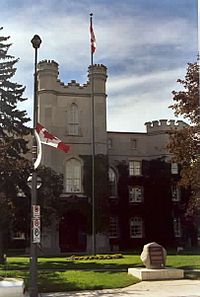Middlesex County Court House (London, Ontario) facts for kids
Quick facts for kids Middlesex County Court House |
|
|---|---|
 |
|
| Location | 399 Ridout Street North London, Ontario, Canada |
| Area | 4 acres (1.6 ha) |
| Founded | 1830 |
| Built | 1829 |
| Architect | John Ewart of York |
| Architectural style(s) | Gothic Revival |
| Governing body | Ontario Heritage Trust |
| Official name: Middlesex County Court House National Historic Site of Canada | |
| Designated: | 1955 |
| Type: | Municipal Heritage Designation (Part IV) |
| Designated: | November 1980 |
The Middlesex County Court House is a really old and important building in London, Ontario, Canada. It's known as a National Historic Site of Canada. This means it's a special place that helps tell Canada's story. The building is famous because it's one of the first examples of a style called Gothic Revival. It was built even before some famous Gothic Revival buildings in England!
Contents
What Does It Look Like?
The Middlesex County Court House is located at 399 Ridout Street North in London. It's a three-story building made of brick that looks like stone. Imagine a castle, and you'll get an idea of its style!
Castle-Like Features
This courthouse has many cool features that make it look like a castle. It has tall, eight-sided towers at each corner. There are also special windows called lancet windows, which are tall and narrow. You'll also see "crenelations" at the top. These are the notched battlements you often see on old castles. The building has a main section in the middle with two wings on the sides.
A Look Back in Time
The Middlesex County Court House has a long and interesting history. It was designed by an architect named John Ewart from Toronto.
Building the Courthouse
Construction of the building started in 1827 and finished in 1829. It was built using stone found right in the local area. When it was first built, it served as a place for court hearings and administrative offices.
A National Treasure
In 1955, the courthouse was given a very special title. It was named a National Historic Site of Canada. This was because it's a very early example of the Gothic Revival style. It was built before even the famous Houses of Parliament in England, which are also in the Gothic Revival style.
Protecting History
Today, the outside of the building and the land around it are protected. This protection comes from the Ontario Heritage Trust. This helps make sure the building stays safe and beautiful for many years to come. It's also protected under a special law called the Ontario Heritage Act.
Images for kids


